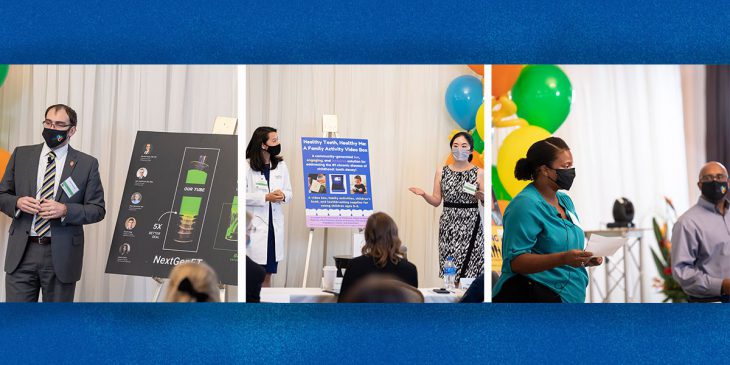Challenging health problems often call for bold and innovative solutions. Thanks to the Pitt Innovation Challenge (PInCh), a diverse group of innovators now have funding to tackle pressing health problems while helping their communities.
Sponsored by the University of Pittsburgh Clinical and Translational Science Institute (CTSI), PInCh 2021 recently awarded a total of $550,000 to eight projects.
“PInCh is all about the problem. It’s not the way we traditionally do science, where we develop and test hypotheses,” said Dr. Steven Reis, director of CTSI and associate senior vice chancellor for clinical and translational research in Pitt’s Schools of the Health Sciences. “It’s about understanding the problem very deeply and then applying existing technologies in a unique way or developing new technologies or new approaches to solve that problem.”
For the top $100,000 award, six finalist teams gave 5-minute presentations to a panel of judges, and three were selected as winners. The other three finalists received $35,000, and all six teams received a $15,000 bonus because their projects aim to prevent or reduce health disparities.
“This year’s finalists pitched solutions to a broad range of health challenges,” said Reis. “Although it was difficult for the judges, the three winners proposed novel projects that are highly likely to succeed and ultimately improve health.”
One of the top awards went to Parenting While Black, a program that provides Black parents with tools to promote their children’s mental health, academic achievement and positive racial socialization. For white parents, there are many resources to help with parenting, according to Dr. James Huguley, associate dean for diversity, equity and inclusion and associate professor in Pitt’s School of Social Work.
“But for Black parents, there is no ‘what to do’ when you are experiencing racism,” said Huguley. “We will use the PInCh funds to build out our program by adding two units with a mental health focus and increasing the mental health content throughout the program.”
Led by Dr. Jacqueline Burgette, assistant professor of pediatric dentistry at Pitt’s School of Dental Medicine, and Dr. Peggy Liu, Ben L. Fryrear Chair of Marketing and associate professor of business administration in Pitt’s Katz Graduate School of Business, the Healthy Teeth Healthy Me Family Activity Box is another of the winning projects.
“The most common chronic disease in childhood is not obesity, diabetes or asthma, but tooth decay,” said Burgette. “Not treating tooth decay can have lasting health consequences. The key to avoiding this costly and burdensome disease is prevention and creating healthy habits. We designed a fun, community-sensitive and community-generated way to help children develop these healthy habits where the action starts: the home.”
Developed with community partners, the family-oriented subscription box will contain an embedded video in the lid, fun oral health activities and free gifts to help children and their families create healthy dental habits. The challenge funds will allow the team to design the box and test its effectiveness in families from diverse Pittsburgh neighborhoods.
The third project to take home a top PInCh award is a novel endotracheal tube called NextGenET. When people need mechanical ventilation for breathing support — due to COVID-19 or other conditions — the breathing tube that is inserted into the airways often fails, allowing bacteria to enter the lungs, which can cause a serious complication called ventilator-associated pneumonia. NextGenET’s innovative design creates a seal that is five times better than traditional tubes, effectively blocking bacteria from entering lungs.
“One in four patients who are ventilated for longer than 48 hours will get a ventilator-associated pneumonia, and of those, between 20% and 30% will die. This is not acceptable to us,” said Dr. Garrett Coyan, chief resident in cardiothoracic surgery at UPMC and a postdoctoral fellow in cardiovascular engineering at the McGowan Institute for Regenerative Medicine. “We have reinvented the endotracheal tube, or breathing tube, to prevent deadly aspiration of bacteria and ventilator-associated pneumonia.”
The other three finalist projects received $35,000 plus an additional $15,000 for addressing health disparities:
• DouLAS-AC: A doula model to provide dignity, legacy, advocacy and support for individuals with advanced cancer in the Pittsburgh Black community.
• The O2 Cube: A solar powered, supplemental oxygen system that can rapidly bring medical oxygen to rural health centers that lack grid electricity.
• TRIBUTE for Bereavement in Communities of Color: A training program for paraprofessionals in communities of color to provide interpersonal psychotherapy to reduce bereavement-related depression.
Of five finalists for the $25,000 Elevator Pitch award, two were awarded funding:
• LiDIA: A low-cost hearing screening plus amplifier device to improve clinical communication. This project also received a $5,000 health disparity bonus award.
• Platelet-Be-Gone-Stent: A novel vascular stent coating process to prevent thrombosis and perfusion.









